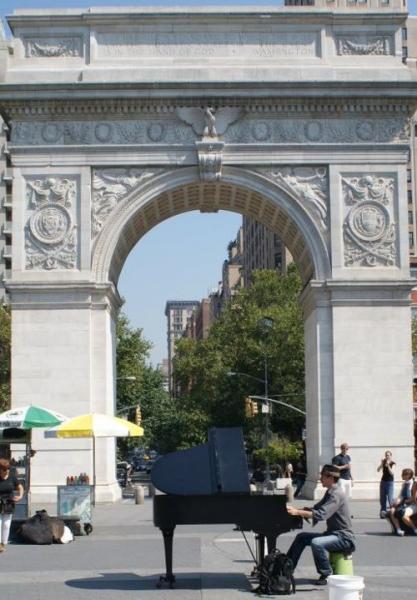A Street Pianist And His New York City

The pianist was shivering in the freezing winter breeze. When he picked up the bucket full of money after the show, girls surrounded him.
He is Colin Huggins, a street pianist. New York City’s crackdown on park performance doesn’t bother him, although he has run into trouble with the police.
The city started issuing tickets toward the end of 2011 to tip-collecting artists if they performed within 50 feet of a monument or landmark. There had been a ban on park performances that went into effect in June 2010. Huggins received about $2,500 worth of tickets. His lawyer friend helped him by arguing that he was not an art vendor. An art vendor is someone who sells paintings or other artistic products in public places. Huggins said the money he receives when he plays piano are donations and he is not selling anything. Therefore he is not violating the law.
Huggins, 34, has been carrying a grand piano and playing around the streets of New York for five years. It only takes him a few minutes to fold the piano legs and put it on a wheel board. He makes more than enough to pay his rent. To him, playing on streets is not only a major source of income but also a life of freedom.
He used to work at American Ballet Theater. He quit after working for six or seven years because, he said, he was tired of helping others perform and never himself.
“One of the reasons that it is exciting to be a musician or any other kind of artist is when you perform for people, you see how you have an effect on them,” Huggins said.
Now he finds that passion on the streets of New York. When he plays in Washington Square Park, he draws crowds of people.
“Being an artist means whatever you create is seen by thousands of people,” Huggins said. “This is the first time it has happened to me. I walk into a bank and someone recognizes me.”
Huggins started playing a guitar at 12 years old. His took piano lessons at 15 years old and decided to become a pianist. He went to music school and focused on piano. At 29, it became clear to him that he wanted to devote his life to making his living on the streets.
“I was sitting in my living room in Brooklyn and talking to my roommate about how to get my music out there," he said. "I thought of just getting an old junkie piano in a truck and taking it out on the streets to see what kind of attention I would get."
The first location he tried was Union Square. The first few times didn’t go well. He said police and people in the park didn’t seem to like him. Huggins blamed his troubles on not knowing the rules, such as the ban on microphone and drums. Life got better after he left and went on to Times Square, Washington Square and subway lines.
Trouble with police was common. He once got into an argument with an officer when he was playing in the subway in 2009. He said a police officer asked him to leave, he refused and argued that he didn’t break any laws. But he always left so he never got arrested.
After three years of moving around, Huggins decided to stay in one place. Now people living around Washington Square all know about Huggins.
Michael David Gordon, a street singer, has a show with Huggins in the square every weekend. Their season together runs from April to September. The concerts sometimes draw as many as a hundred people.
“We draw hundreds of people every night, from hundreds to thousands," Gordon said. "The music brings them together and they are able to connect with each other, to connect with us. It’s a beautiful time."
A lot of people enjoy their music. When Huggins finishes a performance, the crowd will go talk to him.
Their performances are good entertainment for those who can’t afford going to concerts.
“If you want to see a jazz concert in New York City, you are paying $30 to $50," Gordon said. "But people can come to see us and drop $5 to $10 in our hats and they can have an evening full of entertainment."
Huggins said the challenge to playing in the park is that sometimes there are people yelling at him, which is distracting. But he really enjoys making a regular moment into a movie scene by playing piano. He sometimes plays a whole day, shorter when the days get cold.
“Usually I look around and start improvising, creating a melody that exactly explains what goes around me,” he said. “Adding the soundtrack to the moment turns it into a beautiful movie.”
Huggins was not bothered by the regulation on street performers, but many of his friends and fellow street artists want it to stop.
Gordon said, “Music and art are important in what the park is. Music on the streets of New York is part of what makes New York New York.”
--------------
Reach staff reporter Shako Liu here.



